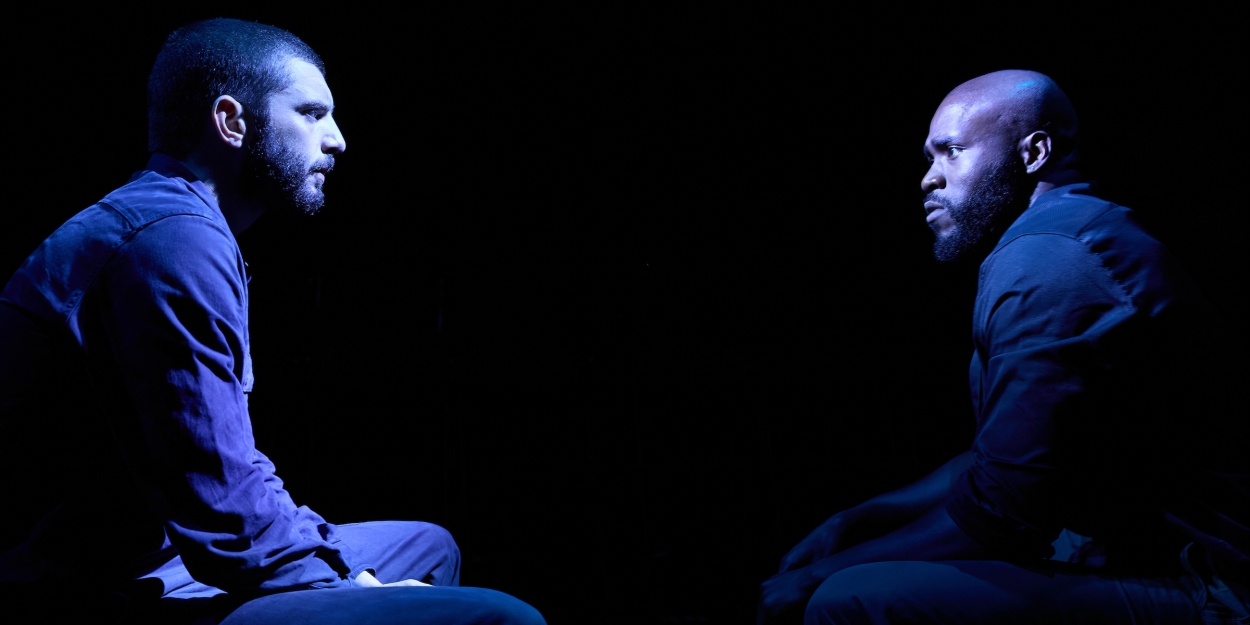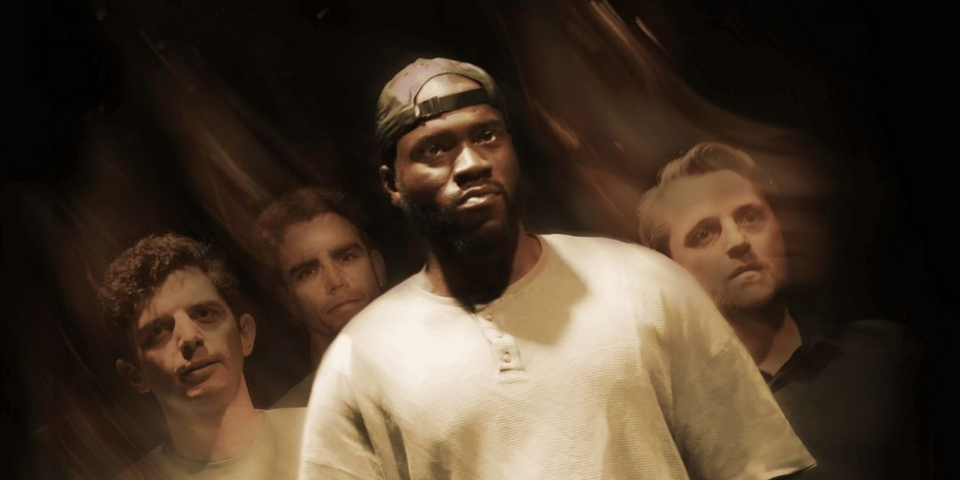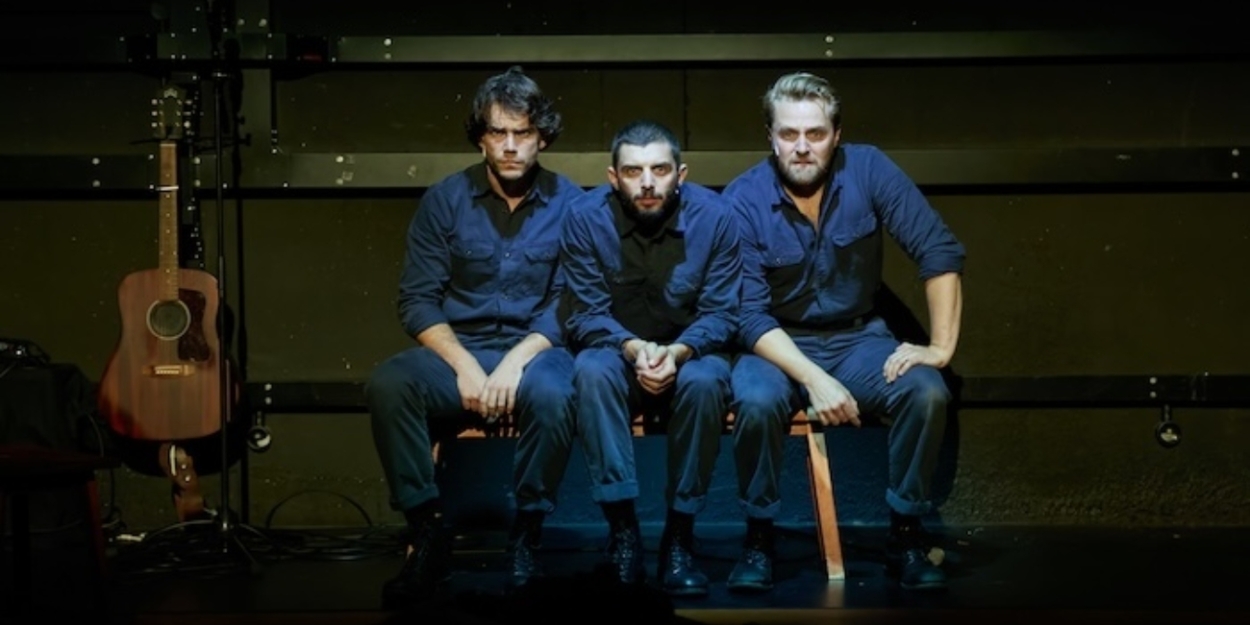Interview: 'OTHELLO is a Tragedy, But It's a Love Story': Michael Fox And Martins Imhangbe on Bringing Shakespeare Into the Modern World
'Othello is a love story. It's a tragedy, but it's a love story. And oftentimes, that love is always lost. '

One of Shakespeare’s iconic tragedies, Othello, was performed in a new light at the Riverside Studios to great acclaim. This production, directed by Sinéad Rushe, brought a new perspective to the piece by having three actors take on the role of Iago, the man behind Othello’s downfall.
BroadwayWorld spoke with two of the actors in the show; Martins Imhangbe (Othello) and Michael C. Fox (Iago). We discussed what made this production of Othello unique, how they worked on developing their characters and how Othello is relatable hundreds of years after it was first published.
What made you both want to be involved in this production of Othello?
Michael: This production, for Martins and I, goes back a long way. We were in the same class at drama school, Central School of Speech and Drama and we did Othello. It's always been in my mind, since that time, of wanting to revisit it and to do it on a professional level with Sinéad [Rushe] as well - she taught us at drama school. So really, the production came from Sinéad, Martins and I coming together and going, “Shall we just try to reconnect with this play?” Well, I have to be honest, first, “Shall we reconnect with each other professionally? And what play should we do?” And that play had to be Othello.
Martins: Yeah, same as Michael. Michael’s an actor whom I've respected and loved his work since drama school. And Sinéad as well, someone who I've grown to respect over the years. So to be able to be in a room with both of these guys and collaborate on this project means so much.
And what is it about Othello in particular that stood out to you?
Martins: For me, Othello is a love story. It's a tragedy, but it's a love story. And oftentimes, that love is always lost. Sometimes it feels that people focus on Iago or focus on the downfall of Othello as opposed to the love that Iago has for Othello, that Othello has for Iago. And for me, I just really wanted to hone in on that theme, which is love. And I feel like Sinéad was also on the same page, same as Michael. And what's rich about this production is that because me and Michael have that longevity in our friendship, the chemistry and the love is there for free, so we're able to lean into that and create from that perspective.

Michael: There's an assumption in reducing Othello down to a white man that hates a black man, and the heart of it is racism. But actually, what we wanted to look at was that they have a history. They've served together, they love each other. Certainly, Iago loves Othello completely. And then when he's overlooked for the lieutenancy, he decides to take him down. But who is that person that can do that to someone and manipulate them in such a way? They have to have built up decades of friendship and trust in order to have that level of contact with someone else. And we felt really strongly that it does Othello a disservice if you don't really lean into and invest in their love before the beginning of the play, into the depth of their relationship.
How have you worked on developing your characters?
Michael: Well, Sinéad works with the Michael Chekhov technique, so it's a lot of physical work. You separate characters into the feeling centre, the thinking centre and the will centre. And through the first few weeks of rehearsals, you're experimenting with where your character sits, mostly in one of the senses, they can switch around. And so lots of the work is a physical exploration.
Martins: We look at archetypes as well, like, “What will be the archetype of Othello?” He might be The Warrior, The King, The Father . . . What might be the archetypes of Desdemona or Iago? And then we try to physicalise that, so we start by physicalising using a psychological gesture, something that really connects or speaks to that archetype. And then what you do is collect that information, internalise it and try to play the scene from that place - which is quite interesting because you can try different ones on for size, see what really can you connect with. But also, with Sinéad’s approach to scenes, she likes to do atmosphere work. So we might take a scene and think about what the atmosphere is, and if this atmosphere holds all the characters.
Michael: It's a process that requires the whole company to jump in. You have to commit fully to the type of work, but it can mean that some lines can really surprise you. If anyone's ever felt like they've said a sentence in real life, and suddenly it spills out of them in a different way than they are anticipating. It’s because that's what we want Shakespeare to feel like - these lines are just spilling out. They're not hundreds of years old. They're ours. And they're new when we say them. So that's what it helps to do to make it feel more organic.
On that note, what is it like being in a radical adaptation of a Shakespearean classic?
Martins: It feels fresh! It feels exciting. Having conversations with people recently, it really speaks to now, because we're not a listening culture anymore. Our attention spans are not as great as they used to be, so I doubt people want to sit through three and a half hours of Shakespeare. So it's nice to be able to adapt it, to make it fresh, add more visual aspects to it, which really invites the audience to fill in the gaps for themselves as well. We don't give them too much. It really speaks to now, in my opinion.
Michael: I think also it's got a lot to do with the general sense in the cast that we had to trim a lot of Othello as a play away to make it speak to now, to take away the parts that are pretty problematic in front of the modern audience. But it's also one of his plays that really does feel on the front foot, lean and not overly poetic. There are some things that we do that feel like they could be a contemporary piece of drama - they're amazing. And audiences are really responding to the fact that it feels really clear and dynamic. Lots of people have talked about it not feeling like traditional Shakespeare and not the Shakespeare they were expecting to come and see, which is great. I think that's why we wanted to put it on, because we felt like we could breathe new life into it.
And for you, Michael, what has it been like working on the music for Othello?
Michael: I’ve loved it! Acting and music has always been a parallel passion. I love to be “all in,” doing the acting, going home and writing music at the weekends or in the evening, bringing them in and trying them out in scenes with Rose and Martins and taking them away again. It's been great! I feel really excited to keep doing this sort of work because I’ve absolutely loved it. It's been very fruitful and fun.
Martins: It's been very open and collaborative, as well. For example, one of our songs is in Urhobo, a Nigerian dialect, and to able to collaborate on that . . . What we've made is amazing. It's really heartwarming to have that in the show.
Michael: It was exciting because I'd written this song before we'd started rehearsals, and we'd had a lot of conversations about wanting to bring in the joy of the people before the play. So I'd written the wedding song, and then Martins had the idea, “Why don’t we translate it?” And now the result is way more exciting because it feels like it's really honouring a part of Othello that we really wanted to put on a pedestal and give light and joy to it. In a sense, that's why some of those ideas from the wedding come back later in the play. Because that's what Iago steals away - the joy, the unification of different cultures. And so ultimately it becomes more heartbreaking because of that.
So it’s been a very collaborative process throughout.
Michael: Definitely. And also from a music point of view, it's a weird thing to share music from your bedroom walls, to just offer it up. In a rehearsal process, as soon as it goes into the room, it's up for grabs - you have to be okay with that. So I've had to hold it a little more loosely and let it be what it is for everyone.
You've both had experience acting both on stage and on screen. What is it like performing on one versus the other? Do you have a preference?
Martins: For me, I don't have a preference. I would say there's nothing like being on stage and having that live reaction from the audience, because it really informs what you do. It's very collaborative. Sometimes you don't expect it! Energies are very infectious - there's nothing like it. And being on screen is great, but once you've done it, you've done it. [Laughs] Whereas with theatre, you have to do eight shows a week! You have to retell the same story. So it takes a lot of stamina. And I often feel like theatre isn't appreciated enough - oftentimes, TV and film gets all the hype and glory. But it takes a lot out of you to commit to doing stage.
Michael: There's nowhere to hide.
Martins: There’s nowhere to hide!
Michael: For me, I love the feeling of being able to lose yourself in a play for an hour and a half on stage. No one can interrupt you! [Laughs] You're just there to do it. You can get lost in the story and find surprises, and all you have is the other actor on stage. There's mistakes, there's things to laugh at afterward, and then you get to it again. There's all these little nuggets of excitement that happen. That can happen on set, but there's more pressure on loads of different things happening in order to make the scene work. It’s a liberating feeling to be just on stage in front of people. Just telling the story is a much simpler thing to do.
What is it like performing in such an emotionally intense play? How do you take care of yourself, while also still bringing those emotions to the stage?
Martins: For me, it's worth remembering why I do it, going back to why I want to be an actor - telling stories and honouring the stories that I choose to tell, making sure that I do it service. I'm devoted to what I commit to, and that helps. I've also been staying physically fit. I have a personal trainer who I check in with. During rehearsals, I was training in the mornings, lunchtimes, just keeping up that physical stamina. But it's good for the brain as well, especially boxing because it's about steps and routine. That really helped me mentally. So staying active, staying sharp, staying mentally primed.
Michael: Yeah! I mean, I just swim. [Laughs] It’s meditative and clears your head. It's as important to be completely engrossed in the play as to find something that's completely different away from it, to let your brain come back to it afresh. So things like boxing, swimming or any kind of physical exercise is really important.
Do you have a favourite scene in Othello?
Michael: In some ways, it's a weird thing to say it's my favourite, but the way that we're staging when Othello falls into a trance, it's very exciting and dynamic. It feels, theatrically, very impressive. It's all of our concepts - live mics, infecting Othello's brain, all of these things. It feels like in that moment, that all comes to fruition. And so I always feel like just before it happens is the most exciting scene.
Martins: I can understand! From the audience's perspective, it takes your breath a bit, because you don't really know what's happening. There's a build as well with music, and I can imagine the audience holding onto their seats. But for me, I think Act Three, Scene Three. It's quite a long scene. It starts very bright and lovely and in the end, it gets really dark. It's quite a journey! It's quite interesting to go from a happy place to that very dark, wanting to kill. So that scene, in terms of its journey.
Michael: It's quite a journey as well, because it's three Iagos, working in thirds. We sort of tag team in. So far Martins, it is quite a journey! He turns around and there’s a different actor standing there! [Laughs]

Has it been weird getting used to the three actors playing one role?
Martins: Yeah! I feel like I'm used to it now, like I've come to terms with seeing them as one and understanding what the function is. Understanding that when there's three of them in the scene, there's something going on internally. So I've really made peace with that in my head. At first, it was quite jarring, quite hard to process. But I think now, it makes a lot of sense, and it really helps with our story.
Michael: Same for me. We've done a lot of work on it. We've done two R&Ds four weeks before rehearsals, and then performance rehearsals really pulling apart what the language of this three Iagos is. I think it's credit to Orlando James and Jeremy Neumark Jones, the other two Iagos, and to Sinéad. We really just waded through it - we weren't sure how it was gonna work with Martins. It took a lot from all of us, just going, “This isn't working,” and wading through it to find another solution. It was difficult, but I stand by what we've landed on.
Each Iago has a coherent journey through it as one does in their own personality. There's parts of everyone's personality in conflict. His is a very extreme version of that. He's a man who's going through a lot more torment - you could argue a psychosis. So we're trying to highlight a man who's not just evil and Machiavellian, twisting his moustache and going with the audience. “Haha, aren't we clever?” We want to say, “This guy is in pain and will forever be in pain.” We’re honouring that, so it's exciting.
What do you hope audiences take away from Othello?
Martins: I hope audiences see fully-rounded human beings. And they see people and all their flaws and all their glory, and hopefully, see themselves within these characters. Not just see the world in black and white.
Michael: For me, it's a play about psychological manipulation, too. It's really important that they see that this tragedy could happen to anyone. It's not specific to Othello. It’s specific to having a friend that knows you so well that they can really pick apart at your innermost vulnerabilities and weaknesses. That really is a relationship that could happen to anyone. And to hopefully not feel like it's out of reach and something historic - it’s immediate and happening today.
Othello ran at Riverside Studios from 12 to 29 October. Read our review here.
Photo Credit: Mark Douet
Comments
Videos
